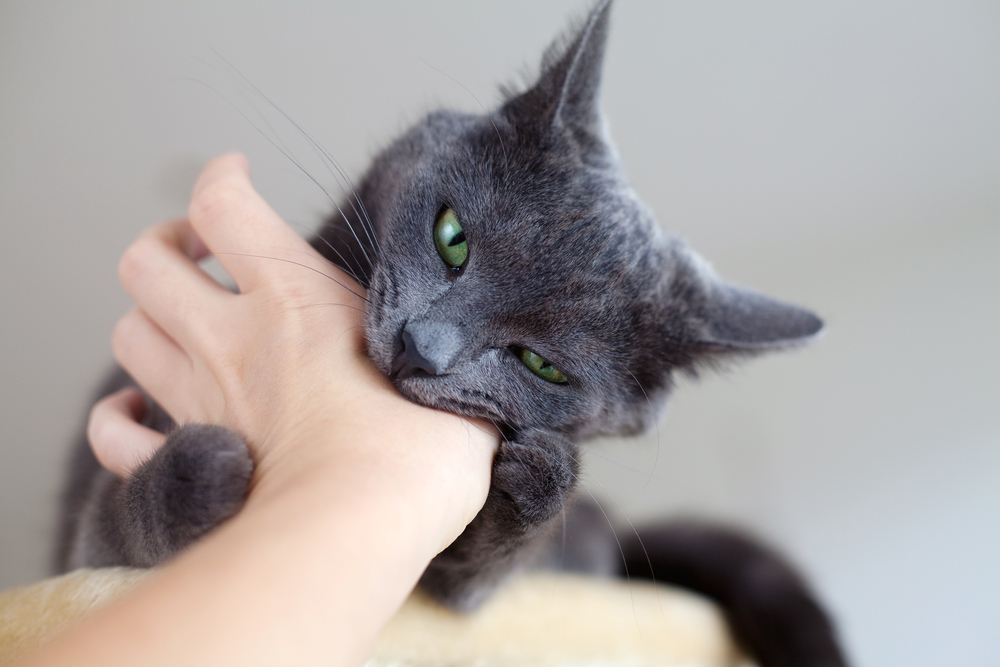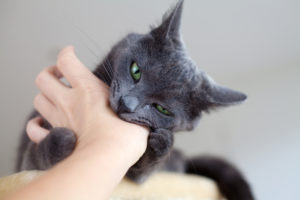Many loving cat owners have been bitten, sometimes even ambushed, by their favorite felines, only to ask, “why does my cat randomly bite me?” This may have happened while you were walking by your kitty in the hallway, or during a petting and purring session, or seemingly out of the blue.
The truth is that, when someone suffers a cat bite, there is nothing “random” about it—the cat is trying to communicate that something is distressing them. Cats have limited ways to “talk” with their owners, and almost all of that communication is through the cat’s body language. Biting is one tool in the kitty toolbox that tells their person, “hey! I need some help over here!”
If you’ve noticed that your previously placid kitten is suddenly biting family members, seeing your local vet should be the first item on your to-do list. One of the most common reasons cats bite is because they are painful or physically uncomfortable somewhere. Your veterinarian can check for signs of an ear infection, painful dental disease, back pain, arthritis, belly pain, and uncomfortable skin conditions. They may recommend bloodwork to evaluate your kitty for hormone problems, and even screening him for high blood pressure if there has been a sudden change in his behavior.
Once medical ailments have been addressed or ruled out, it’s time to really focus on what might be causing your cat to bite.
1. Understanding Playful Biting in Cats
The most common reason that cats bite their owners isn’t that they have an aggressive cat, it’s because they are trying to play! While sharp teeth or claws may not feel very “playful” to you, hunting behavior equals play behavior for your kitty. This means stalking, pouncing, biting, and kicking.
If you have raised your cat since kittenhood, you may have made the mistake of using your hands as targets of play. Waving your hands in front of your kitten’s face, offering your fingers up so their tiny mouths can “munch” on your hand, and similar games teach your growing kitten that hands and human bodies are playthings. This translates to their behavior as adults—when playtime is just as important to them, but their teeth are sharper, and their jaws are stronger!
To re-train your cat that human body parts are NOT meant for chomping, offer them appropriate choices. Have cat toys placed strategically in the living areas of your home. If your cat tries to bite your hands or pounces on your feet, immediately grab the cat toy and use it to redirect your cat’s behavior. Over time, they will learn that toys—not feet or fingers—are a whole lot more fun to play with!
If you don’t have an appropriate cat toy within reach when they start to chomp down on you, simply stand up and walk away from your cat to find one. Keep things calm, so you don’t excite them further—and do not punish your cat, as this can make them more aroused and associate negative emotions with you—exactly what we don’t want!
2. Dealing with Redirected Aggression in Your Feline Friend
This is one of the most common reasons that cats bite their owners. The term “redirected aggression” refers to a cat’s natural instinct to pounce/attack being thwarted and unable to be exercised on the true object of their angst….and then redirected to a convenient target (aka, you!).
Picture this: your cat is staring out the window, watching a neighborhood kitty stroll around in front of your house. Your cat’s tail is twitching, their ears are flattening, they are leaning forward, and possibly growling. You walk over to see what’s got your kitty so focused—or just happen to walk into the room—and your cat suddenly attacks you with teeth and claws. OUCH!
If this sounds familiar, you have been a victim of redirected aggression from your kitty. When your cat is stressed by something or someone, all of that frustration builds up inside—like pressure in a teapot—and eventually, that frustration needs somewhere to go! Unfortunately, that means that the closest moving object is likely to experience kitty’s wrath, and more often than not, it’s you.
While seeing “stranger” cats through the window is a common trigger for redirected aggression, we can see these behaviors in cats any time their frustrations build at an unattainable target. If another human (usually a child!) is bothering your cat, and the cat gets punished for establishing their boundaries by lashing out—then YOU are the most likely target for that pent-up frustration the next time you walk by your kitty.
So, what can you do? If you can look out for these signs of stress in cats and identify the source, then helping them avoid it can short-circuit this process completely. In our example of staring at a neighborhood cat out the window, avoidance can mean lowering the blinds, removing any cat window seats from the area, or placing ultrasonic “cat deterrent” devices on your property. All of these can keep your house cat from getting riled up by seeing someone come into their “territory.” If the problem is more inside of the home, it may take retraining your cats to get along, or teaching humans in the house to stop antagonizing the cat.
As always, plenty of playtime with your cat’s favorite toys is essential for creating those positive endorphins, tiring out your kitty, and giving him an outlet for those hunting and predatory behaviors in a safe and playful way.
3. Preventing Petting-Induced Aggression in Cats
“I was having a petting session with my cat, and she was purring…and then WHAM! Out of nowhere, she bit me!” Another common cause of cat biting is petting-induced aggression. We all know that cats are very particular about most things—their bathroom, their food, their toys…and of course, those personal preferences extend to their bodies!
When an adult cat is biting while being petted, it’s a way for the cat to tell you, “I don’t like that.” It could be that your cat likes to be pet in some places more than others, or pet more in short strokes rather than long whole-body pets, or only for short periods of time.
Since cats tend to groom each other around the face and neck, cats usually prefer for their humans to focus on these areas, too. While your cat might like short pets around the ear, cheeks, and chin, they might be uncomfortable with petting near their tail, on their belly, or even along their back. Pay attention to the signals your kitty is sending you—if her ears start to flatten, she stops purring, or her tail starts flicking—take your hand away and see if she relaxes again. It’s up to humans to understand what our cats are trying to tell us—and just like people, every cat has certain body parts that are “off-limits.”
While we humans LOVE scratching and petting our kitty companions and consider it an expression of love and affection, keep in mind that long strokes tend to build up energy within your cat. By petting down the length of their body over and over, you may be winding your cat up with excess stimulation that needs to come out—and that outlet is usually through biting or running away. If we continue to ignore what our cats are telling us, they may preemptively try to bite us if they feel like we are going to engage in an unwanted behavior—and so we may see a cat “randomly” pounce on our feet or attack our legs as we walk by. In some cats, this sudden aggression is merely a protective strike, meant to prevent previously unwanted stimulation.
If your cat seems to have a low tolerance for petting and runs away after a few strokes, or starts to bite after a couple of pets, then our choices as humans are simple: either acknowledge your cat’s boundaries and accept them, or try to build a positive feeling when your cat is being petted. You can do the latter by feeding your cat super yummy treats or canned food and petting them briefly while they enjoy—the whole goal is to make receiving pets a positive experience for your cat.
4. Speaking Your Kitty’s Language
By now, you can see that when your cat bites you, it is almost never truly “random”—they usually have a reason for doing so, and it’s up to us kitty caretakers to understand what our cats are telling us! If you have tried identifying any triggers outlined here and are unsuccessful in figuring out why your cat is biting you, then you may need to see a board-certified veterinary behaviorist to evaluate your kitty for a true mental health problem.
Our AskVet Veterinarians are available to discuss all of your pet’s needs 24 hours a day, 7 days a week. Whether it’s learning how to calm down a cat or understanding why a cat is pooping outside the litter box, just sign into your account and one of our friendly and knowledgeable veterinary experts will attend to your needs, no appointment required. Chat with an online veterinarian at AskVet today!
Written by:
Allison Ward, DVM
Dr. Allison Ward grew up in the suburbs of Washington, D.C. and started working in veterinary hospitals when she was 14 years old. After graduating from veterinary school in 2011, she completed a small animal rotating internship in New Jersey, followed by a neurology/neurosurgery internship in Miami. After completing this advanced training, Dr. Ward then moved on to general small animal practice. Dr. Ward’s professional interests include feline medicine, neurology, and pain management. Her passion for educating pet owners carries over into her work with AskVet, and she loves being able to help pets and their parents at all times of the day (and night!). She currently resides in sunny south Florida with her two cats, Larry and George.








